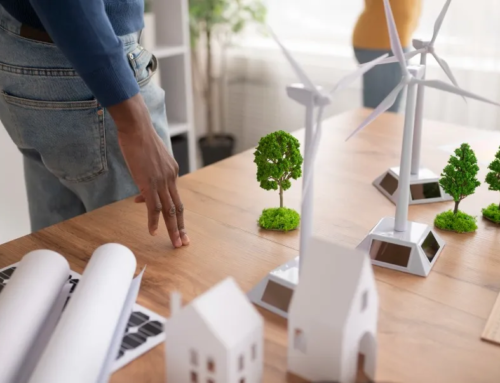Summer is here, and energy prices are rising. This is typical: Prices tend to increase along with usage in the summer and go down in the winter.
The cost of electricity is made up of many factors, but the biggest ones are the amount of supply available, building and maintaining grids, and operating these grids.
Luckily, there are plenty of energy-saving tips for summer that can help you save energy!
18 Summer Energy Saving Tips
There are several ways to save energy during the summer. Most of these strategies don’t even cost anything and are absolutely free!
1. Turn Off Unneeded Lights
It’s easy to walk out of a room and forget to turn off the light, but that light takes up unnecessary energy. Make a habit of turning off lights when you leave a room and occasionally checking around the house to ensure they’re off.
2. More Natural Light
Along with turning off lights, try to use more natural light. This can be a balancing act in the summer since you want to stay cool and sunlight generates heat. However, utilizing that sunlight has more benefits besides saving energy, like delivering vitamin D to your body.
3. Shorter Showers
We all love taking a long shower, especially after a hard day. But if you cut down your shower time, it can help reduce energy use through the water heater, which requires energy even if your shower is not necessarily hot.
4. Wash Clothes in Cold Water
Did you know that 90% of a washing machine’s energy usage goes towards heating water? Imagine how much energy you’ll save washing your clothes in cold water. Plus, cold water is better for getting out stains.
5. Hang Clothes to Dry
If you can, skip the dryer and hang your clothes out to dry. You may as well take advantage of the sunlight beating down on you and save energy at the same time. Just don’t leave your clothes outside for too long!
6. Unplug Electronics Not Being Used
Even if you aren’t using a device, having it plugged in still uses power. If there are any electronics you don’t think you’ll use for a while, unplug them. Around 10% of residential energy is used by standby devices. Leaving unused electronics plugged in can amount to over $100 dollars a year!
7. Turn Up the Thermostat
While you want to stay cool in the summer, turning up the thermostat can help save energy. Of course, only go as high as you can stand; you don’t want to make yourself sick due to the heat.
8. Close Curtains and Blinds
As mentioned before, sunlight generates heat, even when you’re inside. If you’re trying to keep your house cool, close curtains and blinds on the windows facing direct sunlight. You can open them again when the sun’s position changes.
9. Change Lightbulbs
If you haven’t already, you should invest in energy-saving LED light bulbs. They work just as well as traditional bulbs but use about 75% less energy. They can also last 25 times longer than conventional bulbs.
10. Give Your AC Some TLC
When you only use it once a year, maintaining an AC tends to slip your mind. Cleaning up your AC, especially its filters, will save energy because it won’t have to work as hard. Not only will maintaining your AC conserve energy, but it’ll also extend the life of your machine.
According to the Energy Department, changing an old, dirty filter with a clean filter will cut energy consumption by 5% to 15%.
11. Use Fans
While jumping straight to the AC when it’s hot is tempting, maybe think about using a fan instead. Fans don’t use nearly the amount of energy an AC does. If it’s hot, use fans with your AC to spread cool air around faster.
12. Close Doors to Rooms Not Being Used
When running the AC or fan, close doors to rooms you won’t use immediately. This will allow your house to get cooler faster and not use as much energy.
13. Avoid the Oven
While it won’t keep you warm in winter, your oven can raise the temperature of your kitchen by a few degrees. Reducing your use of the oven will also reduce the need for cooling down.
Instead, use the microwave or do some grilling outside if you can stand the heat.
14. Seal Up the House
You would be surprised how having a few cracks here and there can drive up your energy consumption. In the summer, all that cool air is going right out the window, literally. Windows and doors are notorious for either not being completely sealed or having the seal degrade with time.
Resealing with caulk or foam sealant will drastically decrease your energy use. This can also help keep you warm during the winter, so it’s a win-win.
15. Turn Up the AC When You Aren’t Home
This may seem counterintuitive, but turning off the AC when you aren’t home causes the AC to work overtime when you return. Instead of turning the AC off, try turning up the temperature 5-10 degrees. This will give the system a break, and keep the house relatively cool.
16. Open Windows at Night
If the temperature is cooler at night, take the opportunity to open your windows and get natural cool air. This will also help get warm, stale air out.
Doing this will make it easier to not turn on your AC immediately the next day, especially if you combine it with closing curtains/blinds.
17. Use Smart Plugs
Smart plugs are like regular plugs, except they help you control the amount of energy that goes into your devices, and you can sync many of them with an Alexa or Google home device that can be voice-activated. Convenience and sustainability all at once!
18. Clean Around Your Dryer
Like with your AC, you should clean up around your dryer. Lint can build up easily and clog pipes and vents, especially the dryer vent that leads to the outside. This means your dryer will work harder and cause more energy usage. Sometimes it’s wise to vacuum out your dryer vent pipes and clear away lint buildup.
Keep Cool and Conserve Energy
Despite what the weather tells you, staying cool and conserving energy is possible. You can use a lot less energy by just making a few changes to your daily routine.
If you’re interested in saving more energy, enrolling with Kiwi Energy can help you save energy year-round and earn $25 a month with Kiwi Rewards.






